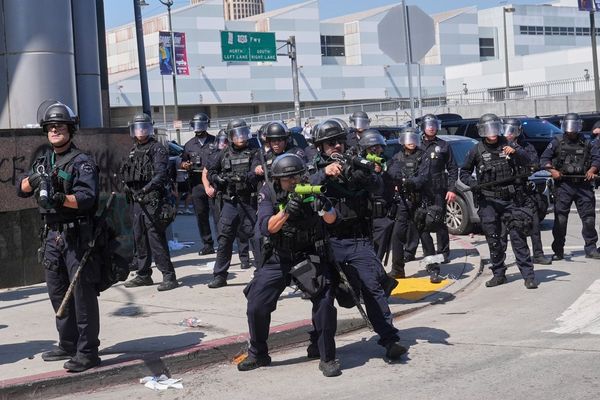For the first time in more than 60 years, both actors and writers are striking in Hollywood. With almost all productions coming to a halt, the writers' strike could turn into a big problem for Netflix since the streaming giant relies on fresh content to keep its subscriber growth robust.
But it may be in a unique position to survive the walkouts. A deep library of programming, international productions and a crackdown on password sharing are helping insulate Netflix from taking a hit as the entertainment industry hits the pause button.
"We've got a lot of work to do," Netflix co-Chief Executive Ted Sarandos said on the company's recent second-quarter earnings call. "There are a handful of complicated issues. We're super committed to getting to an agreement as soon as possible. One that's equitable and one that enables the industry and everybody in it to move forward into the future."
Subscriptions Strong Despite Writers' Strike
While the unions and studios work on a deal, Netflix isn't feeling the pain of the writers' strike just yet. Subscriber growth is strong.
According to Netflix's earnings report, it added nearly 6 million new subscribers in the second quarter, bringing its worldwide total to about 238 million members.
This surge comes after the company launched its paid-sharing program in May, an effort to put a stop to Netflix password sharing.
However, revenue from millions of new members wasn't enough to meet Wall Street views. Netflix reported second-quarter revenue of nearly $8.2 billion, below analyst expectations.
The lower-than-anticipated sales stemmed from new subscribers in countries with cheaper service rates, as well as members opting for less expensive ad-supported plans, according to Netflix.
NFLX stock gapped down more than 8% in heavy volume following the report, but shares are now trying to find support around a rising 50-day moving average. Shares fell 2.1% Wednesday to close at 428.90.
Even with the post-earnings plunge, Netflix stock is still up roughly 40% this year. That indicates the actors' and writers' strikes have not had a material impact on NFLX's price action as of yet.
Writers' Strike & Netflix Financials
Wedbush Securities Vice President of Equity Research Alicia Reese argued although the lower-cost plans weighed on Netflix's financials last quarter, an upward trend for average revenue per user is in her forecast.
With subscriber numbers hitting record levels, Netflix can expect to see even more sign-ups once college students go back to campus after summer break.
Reese said that students are still on their parents' Wi-Fi networks. They need to be off the home Wi-Fi network for three months before that algorithm trips.
"Netflix is notified that this person is using the subscription outside of the home network. And then the primary subscriber will then be asked if they want to pay extra for that user or cut them off," Reese said. "And at that point, especially for college students, most of the parents are probably going to keep them on. It's only eight bucks."
She added: "So that's all incremental revenue, incremental profitability, incremental free cash flow."
In terms of free cash flow, this is where the actors' and writers' strikes may actually help Netflix. It's not paying production costs right now.
In its second-quarter earnings report, Netflix noted it expects $5 billion in free cash flow this year, up significantly from an earlier estimate of $3.5 billion.
The streamer said in a letter to investors, "We're currently running a bit above our targeted minimum cash level, so we expect to increase our stock repurchase activity in the second half of 2023, assuming no material change in our business."
Netflix Is 'Enemy No. 1' In Writers' Strike
The Writers Guild of America walked out in May. The Screen Actors Guild and American Federation of Television and Radio Artists followed in July after union members demanded better pay. They also seek more money from streaming companies through residual or licensing fees.
Barron's Associate Editor Eric Savitz says Netflix is a huge target of the Hollywood walkouts. Many of the striking workers see the streaming giant as "enemy No. 1."
"People are picketing outside their offices in L.A., and then in Silicon Valley," he said.
However, the writers' strike is taking less of a toll on Netflix than some of its competitors. The streaming studio's international productions are one key reason.
"They make programming in Korean and in French and in Italian. And in some cases, they (foreign language programs) have done really well even in the U.S. market," Savitz said. "Think about Squid Games, for example, which is something Korean. And so the result is they have a deeper base of programming to choose from than some of their streaming rivals."
Even a number of reality television and other unscripted properties have union writers attached to them. So they too are not currently in production. But Netflix already has enough programming ready to go to last them if the actors' and writers' strikes were to go on for a number of months.
Netflix & Chill: Production Put On Ice
"At some point in time, are the strikes going to be a problem? Yeah, because at some point in time, people would like to see the next season of say, 'Stranger Things,' and they can't see it if they don't shoot it," Savitz noted.
And then there are live sports, which are actually mostly unaffected by the writers' strike. Unlike some competitors and network television, Netflix doesn't air any of it. So should the industry's pipeline of new content dry up, the company could run the risk of some viewers theoretically switching the channel to tune into a game.
Others who've exhausted their Netflix queues may take the opportunity to catch up on shows they've missed elsewhere. Last year there were nearly 600 original scripted series offered over broadcast, cable, and streaming services, according to FX research. With the actors' and writers' strikes, this "Peak TV" period could come to an end.
"What you're starting to see is budgets are going to tighten. So you've already seen this on some networks where they're going to produce a little less content. They're going to be a little choosier about what they produce," Savitz said.
The streaming company MAX recently removed the "Westworld" series from the platform in order to save money.
"Netflix is better positioned than most of their rivals financially. But all of them have pressure to make this a more profitable endeavor," Savitz said.







